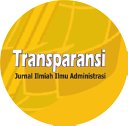Evaluasi Kualitas Hasil Pemeriksaan Pajak yang dapat Dipertahankan di Majelis Banding Banding Pengadilan Pajak pada KPP Pratama Cikarang Utara Kabupaten Bekasi
DOI:
https://doi.org/10.31334/transparansi.v7i2.4726Keywords:
Quality Evaluation, Tax Audit, Tax Court,Abstract
This study aims to improve the quality of tax audit results that can be maintained in the Tax Court Appeals Panel at the North Cikarang Pratama Tax Office, Bekasi Regency. The background of the problem in this study is the phenomenon of the percentage of Tax Court decisions on the victory of the Directorate General of Taxes being smaller than Taxpayers. This study was conducted using a qualitative descriptive analysis method to describe and explain in detail the existing phenomenon using interview techniques as a supporting instrument. In this study, the researcher used an evaluation theory which includes: effectiveness, adequacy, equity, responsiveness, and precision. The results of the study indicate that the quality of tax audit results at the North Cikarang Pratama Tax Office has not fully met the elements in the evaluation theory, namely effectiveness, adequacy, equity, responsibility and accuracy because not all tax records can be maintained in the Tax Court Appeals Panel. Obstacles in achieving quality tax audit results come from the North Cikarang Pratama Tax Office as the executor of tax audits and from the Taxpayer as the party being audited. The solution taken to overcome obstacles is to optimize the compliance of the committee's role to ensure the quality of tax audit results, improve the quality of tax auditors and provide socialization to taxpayers so that they have a cooperative attitude during tax audits. Abstrak Penelitian ini bertujuan untuk mengevaluasi kualitas hasil pemeriksaan pajak yang dapat dipertahankan di majelis banding Pengadilan Pajak pada KPP Pratama Cikarang Utara kabupaten Bekasi. Latar belakang masalah dalam penelitian ini adalah adanya fenomena persentase putusan Pengadilan Pajak atas kemenangan DJP lebih kecil dari Wajib Pajak. Penelitian ini dilakukan dengan menggunakan metode analisis deskriptif kualitatif untuk mendeskripsikan dan menjelaskan secara detail fenomena yang ada dengan menggunakan teknik wawancara sebagai instrumen pendukung. Dalam penelitian ini, peneliti menggunakan teori evaluasi yang meliputi: efektivitas, kecukupan, pemerataan, responsivitas, dan ketepatan. Hasil penelitian menunjukkan bahwa kualitas hasil pemeriksaan pajak pada KPP Pratama Cikarang Utara belum sepenuhnya memenuhi unsur unsur dalam teori evaluasi yaitu efektivitas, kecukupan, pemerataan, responsivitas dan ketepatan karena tidak semua sengketa pajak dapat dipertahankan di Majelis Banding Pengadilan Pajak. Hambatan dalam mencapai kualitas hasil pemeriksaan pajak berasal dari sisi KPP Pratama Cikarang Utara sebagai pelaksana pemeriksaan pajak maupun dari sisi Wajib Pajak sebagai pihak yang diperiksa. Solusi yang diambil dalam mengatasi hambatan adalah dengan mengoptimalkan peran komite kepatuhan untuk menjamin kualitas hasil pemeriksaan pajak, meningkatkan kualitas pemeriksa pajak dan sosialisasi kepada wajib pajak agar memiliki sikap kooperatif saat pemeriksaan pajak.References
Direktorat Jenderal Pajak. (2023). Laporan Tahunan 2023. Jakarta: Kementerian Keuangan RI.
Dunn, W. N. (2004). Public Policy Analysis: An Introduction. Upper Saddle River, NJ: Prentice Hall.
Ilyas, B., & Wicaksono, S. (2015). Perpajakan Indonesia: Teori dan Kasus. Jakarta: Salemba Empat.
Miles, M. B., & Huberman, A. M. (1994). Qualitative Data Analysis: An Expanded Sourcebook.
Thousand Oaks, CA: Sage Publications.
Sugiyono. (2017). Metode Penelitian Kualitatif, Kuantitatif, dan R&D. Bandung: Alfabeta. Akbar, M. F., & Mohi, W. K. (2018). Studi evaluasi kebijakan (Evaluasi beberapa kebijakan di
Indonesia). Gorontalo: Ideas Publishing.
Arifin, Imron (1996). Penelitian Kualitatif dalam Ilmu-ilmu Sosial dan Kegamaan. Malang: Kalimasahada Press.
Asmorowati, Meiti, (2011), Sengketa Keberatan Dibandingkan dengan Sengketa Pengadilan Pajak berdasarkan Peraturan yang berlaku. Bandung; Jurnal wawasan Yuridika, Sekolah Tinggi Hukum Bandung
DeAngelo, L.E. 1981. Auditor Size and Audit Quality. Journal of Accounting and Economics 3 (December): 183-199
Direktorat Jenderal Pajak. (1999). Direktorat Jenderal Anggaran dari Masa ke Masa 1966 – 1999. Jakarta: Direktorat Jenderal Pajak.
Gumilang, Galang Surya. (2016). Metode Penelitian Kualitatif dalam Bidang Bimbingan dan Konseling. Kediri: Jurnal Fokus Konseling, Volume 2 Nomor 2, Hlm. 144-159.
Hadi, Sumasno. (2017). "Pemeriksaan Keabsahan data penelitian kualitatif pada skripsi." Jurnal Ilmu Pendidikan 22.1
Hutabarat, D. D. (2021). Marketplace pemerintah: kerangka teori dan operasional pengembangan dan implementasi marketplace pemerintah di indonesia. Direktorat Sistem Perbendaharaan, Direktorat Jenderal Perbendaharaan, Kementerian Keuangan.
, (2023). Evolusi Sistem Pembayaran Pemerintah Di Indoenesia.
Kementerian Keuangan.
Krishnan, G dan P. Schauer. 2001. Differences in Quality Among Audit Firms. Journal of Accountancy. July: 85
Lowensohn, S.L., L. Johnson, R. Elder, dan S. Davies. 2007. Auditor Specialization, Perceived Audit Quality, and Audit Fees in the Local Government Audit Market. Journal of Accounting And Public Policy Vol.26: 705-732
Muhadjir, Noeng (1992). Metode Penelitian Kualitatif. Yogyakarta: Rake Sarasin.
Rahardjo, Mudjia (2011), Metode Pengumpulan Data Penelitian Kualitatif. UIN Maliki Malang.
Sahila, K. Amrin. (2018). Analisis Siklus Pengeluaran Uang Persediaan Pada Kantor Pengawasan dan Pelayanan Bea dan Cukai TMP B Palembang. Universitas Tridinanti Palembang.
Tan, T.H. dan K. Alison. 1999. Accountability Effects on Auditor’s Performance: The Influence of Knowledge, Problem Solving Ability and Task Complexity. Journal of Accounting Research: 209-223
Widodo, R., Sihombing, W. P., Budhisusetyo, A., dan Harjowiryono, M. (2014). Cash Management Reform in Indonesia: Making the State Money Work Harder. Washington, DC: World Bank Group.
Downloads
Published
Issue
Section
License

This work is licensed under a Creative Commons Attribution-ShareAlike 4.0 International License
Please find the rights and licenses in Transparansi : Jurnal Ilmiah Ilmu Administrasi By submitting the article/manuscript of the article, the author(s) agree with this policy. No specific document sign-off is required.
- License
The commercial use of the article will be governed by the Creative Commons Attribution license as currently displayed on Creative Commons Attribution-ShareAlike 4.0 International License.
2. Author(s)' Warranties
The author warrants that the article is original, written by stated author(s), has not been published before, contains no unlawful statements, does not infringe the rights of others, is subject to copyright that is vested exclusively in the author and free of any third party rights, and that any necessary written permissions to quote from other sources have been obtained by the author(s).
3. User Rights
Transparansi : Jurnal Ilmiah Ilmu Administrasi spirit is to disseminate articles published are as free as possible. Under the Creative Commons license, Transparansi : Jurnal Ilmiah Ilmu Administrasi permits users to copy, distribute, display, and perform the work for non-commercial purposes only. Users will also need to attribute authors and Transparansi : Jurnal Ilmiah Ilmu Administrasi on distributing works in the journal and other media of publications.
4. Co-Authorship
If the article was jointly prepared by more than one author, any authors submitting the manuscript warrants that he/she has been authorized by all co-authors to be agreed on this copyright and license notice (agreement) on their behalf, and agrees to inform his/her co-authors of the terms of this policy. Transparansi : Jurnal Ilmiah Ilmu Administrasi will not be held liable for anything that may arise due to the author(s) internal dispute. Transparansi : Jurnal Ilmiah Ilmu Administrasi will only communicate with the corresponding author.
5. Miscellaneous
Transparansi : Jurnal Ilmiah Ilmu Administrasi will publish the article (or have it published) in the journal if the article’s editorial process is successfully completed. Transparansi : Jurnal Ilmiah Ilmu Administrasi editors may modify the article to a style of punctuation, spelling, capitalization, referencing and usage that deems appropriate. The author acknowledges that the article may be published so that it will be publicly accessible and such access will be free of charge for the readers as mentioned in point 3.
Every accepted manuscript should be accompanied by "Copyright Transfer Agreement"prior to the article publication.











